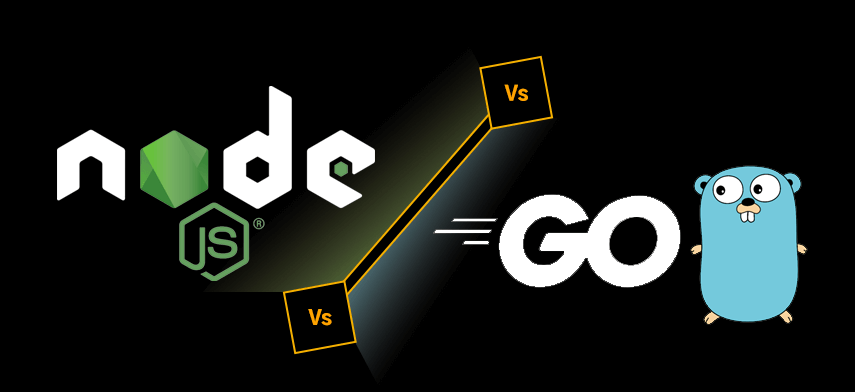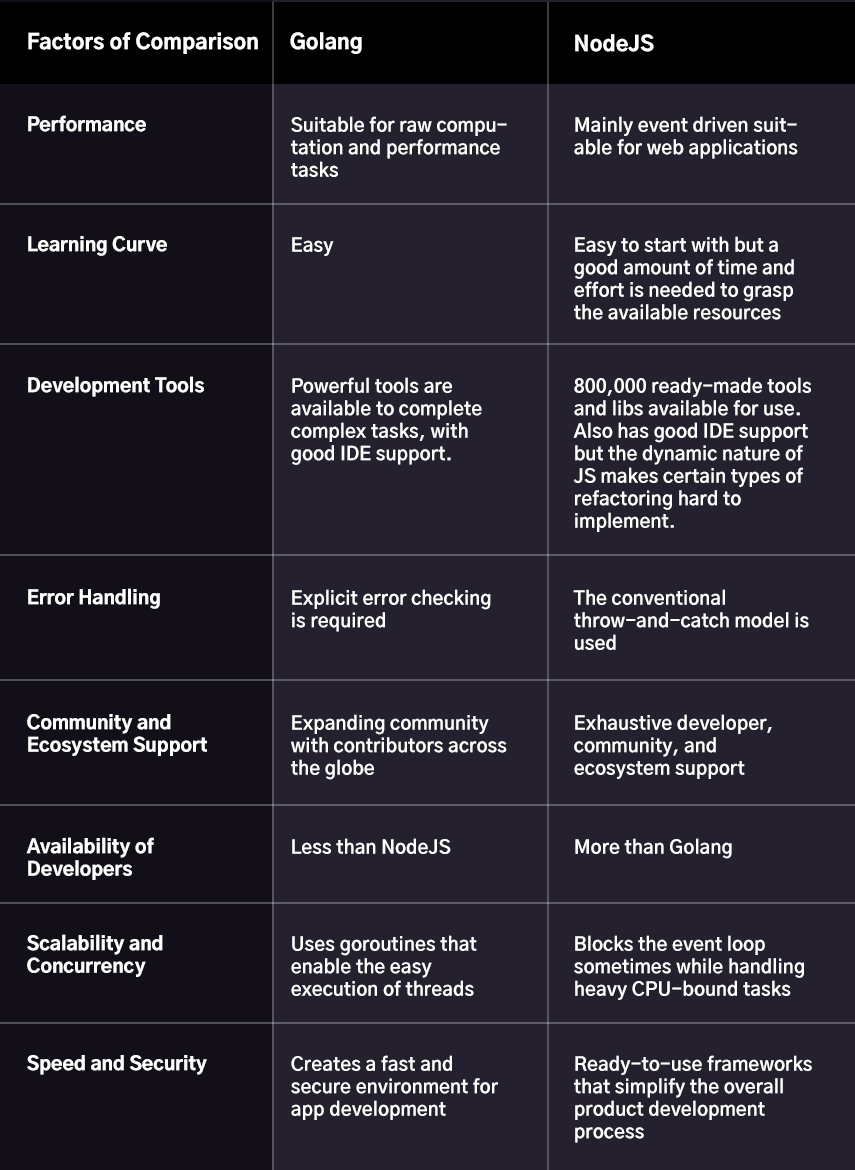For your applications to run smoothly, it’s really important to have a robust backend. But choosing the perfect technology stack that can satisfy this requirement is nothing less than a challenge. You need tools that help you build and scale data management, application programming interfaces (APIs), and less-user-facing code. For many companies, NodeJS was their go-to environment for backend development. Today, this scenario has changed with top companies like Uber migrating to Google’s Golang.

Since its first appearance in 2009, Golang has gained enough traction across the backend development. On the flip side, released at the same time, NodeJS has also earned its popularity among programmers for its cross-platform capabilities. With all that said, how to decide and pick the one that matches your unique business needs?
With all that said, how to decide and pick the one that matches your unique business needs? – Golang or Nodejs? This blog shall answer this question in detail by comparing Golang vs NodeJS and help you make the right choice for your upcoming 2022 projects. But first, let’s take a closer look at some of the basics.
What is NodeJS?
NodeJS is an open-source JavaScript runtime environment designed to meet the requirements of complex, highly scalable network applications. Built on Google Chrome’s V8 JavaScript engine, this environment helps you develop apps that have the potential to run on multiple platforms, including Linux, macOS, and Windows. NodeJS is written in JavaScript, making it easier for programmers to execute both server-side and client-side coding using a single language.
With NodeJS, JavaScript has successfully evolved over the years to achieve full-stack development – not only for the frontend but backend as well. This also makes it one of the most preferred event-driven environments for web application development.
Not to mention that NodeJs is being used by top companies like Netflix, Linkedin, Trello, PayPal, and Medium, to name a few, to accelerate app development using NodeJS.
What is NodeJS Used for?
Experts recommend NodeJS for package management via browser, JavaScript Package Manager (JSPM), Node Package Manager (NPM), etc. It is used to create back-end web apps and development tooling such as task running & automation through gulp or grunt, managing modules with webpack, etc. Some other use cases may include the development of chatbots and neural networks.
Now that we covered the major facts about NodeJS, let’s move forward to understanding its pros and cons.
Pros
- NodeJS has been regarded as one of the most favorable platforms to build scalable applications.
- You can use NodeJS for backend enhancement and also accelerate your frontend capabilities in a hassle-free way.
- With JSON support, NodeJS helps developers build RESTful APIs for the NoSQL databases in the easiest way possible.
- It’s supported by a large, strong, and active developers’ community which helps it keep up with the times.
- NodeJS can work with a microservices architecture, enabling easy integration of new elements into your app.
- Its light in weight characteristic helps your developers to speed up the development process and launch apps quickly and efficiently.
Cons
- It’s unable to address heavy computational tasks.
- Its recurrent, backward-incompatible API changes lead to heavy code alterations.
- Node JS has a very small standard library which requires developers to depend on many third-party libraries.
- The market is unable to satisfy the need to hire NodeJS developers effectively.
What is Golang?
Golang, also known as Go, is a statistically typed open-source programming language designed by Google to deliver software solutions faster. Like NodeJS, it’s also a cross-platform, multipurpose language strongly recommended for web development. What makes it developer-friendly is that it combines the strength and overcomes the limitations of other languages to solve prevailing and upcoming programming issues. It possesses a simple yet clear syntax to write readable and easily maintainable code.
Go is also a structural language that holds an even mix of security & performance benefits of C++/ C. It’s built on the principles of Python for speed of development which makes it a preferred choice of most programmers across the globe. Its modern programming features make the process of writing code more efficient and easier than ever before.
Today, many tech giants like Intel, Dropbox, Kubernetes, Docker, Heroku, etc., are using this language.
What is Golang Used for?
Go is used to develop various applications, especially for system programming. Developers readily use it to create high-end modular systems focusing on speed & security and various other large-scale distributed systems. It’s also well known for its implementation across highly scalable network applications and servers. The language also proves significant for cloud-based interfaces and related development tasks. Other Golang use cases include live application platforms, big data/ machine learning apps, and microservices.
Now, let’s check out the pros and cons of Golang:
Pros
- Golang is backed by static typing, enabling the compiler to identify complete classes of bugs efficiently.
- The language has structural typing (also called as duck typing), and any struct can satisfy an interface as long as it provides necessary methods. This helps decouple the coding dependencies and write more testable code.
- Golang has a big standard library and concrete packages that offer easy-to-use built-in functionalities to work on primitive types.
- This standard library also comprises testing support, which eliminates any other dependency.
- Managing memory in Go is much easier with garbage collection.
- Concurrent programming becomes much easier, and you can effortlessly create a lightweight thread, called a ‘goroutine’, and engage with it through a ‘channel’.
Cons
- The language doesn’t have generics which leads to copy-paste style of code for certain solutions.
- Go doesn’t have tunable GC like Java.
- Being a relatively new language, the market is unable to satisfy the need to hire Golang developers effectively.

Discussing the pros and cons is not the only aspect that can help you make the right decision. That’s why our next section focuses on pointing out the key differences between the two alongside highlighting their uniqueness.
Golang vs NodeJS: Key Differences to Keep in Mind
There are various distinguishing factors that you need to consider while choosing one. Let’s take a look at some of these factors and make this process much easier for you and your development team.

Performance
Both NodeJS and Golang show good performance while dealing with the heavy load, but there are some areas which you need to look into clearly. Compared to NodeJS, Golang is more suitable for raw computation and performance oriented tasks. Its ability to work without an interpreter and compile its code right into machine code without any virtual machine enables it to offer the same level of performance as low-level languages.
Indeed, the built-in garbage collector in Golang helps liberate unused memory and promotes faster processing. But it also protects from the risks and other security issues related to memory leakage. On the other hand, NodeJS is based on the JavaScript V8 engine, which helps developers to reuse code. This makes it a perfect platform to create event-based apps. But when it comes to raw execution speed and memory-based tasks, NodeJS proves less effective than Go.
Apart from all this, both platforms perform equally well when database server interaction or network applications are involved. Altogether, when comparing NodeJS vs Golang performance 2022, they have their own unique programming abilities.
Learning Curve
Golang is a relatively new language but it is very easy to learn. However, developer resources such as tutorials and courses are less compared to Node.js
Conversely, JavaScript is the most commonly used programming language across the globe. Hence, it’s easy for programmers to learn NodeJS compared to Go. Even if they have a basic knowledge of JavaScript, they are good to go. Also, many online/offline resources are available for beginners as well as professionals to learn NodeJS and enhance their expertise.
Development Tools
As a business owner, you must surely agree that the availability of wide-ranging development tools and libraries for a project is directly proportional to lesser development costs and time. And NodeJs stands tall in offering these tools for almost any task. From basic to complex project handling, the JavaScript ecosystem can help you accomplish various use cases. With NPM, you get approximately 800,000 ready-made tools and libs to help your developers design world-class solutions.
Talking about Golang, it also has powerful third-party libraries to complete complex tasks but compared to NodeJS, they are lesser. It has a comprehensive library, advanced tools like GoMetaLiner, Godoc, etc., and also supports third-party integrations. But these things don’t give Go a leading edge over NodeJS tools.
Error Handling
In Golang, handling errors requires your developers to practice explicit error checking. Here, the run-time and compile-time errors are to be handled with a uniquely different approach that leads to various issues and increases the development time.
On the contrary, NodeJS follows a conventional throw-catch model, which is also quite popular among the developer community.
Community and Ecosystem Support
Open-source projects need the contribution of several developers and a large, strong community to support them. Both Golang and NodeJS are open-source with an exhaustive developer community, and ecosystem support. But when comparing the two, NodeJS comes out as a mature platform that observes a stable professional community offering long-term support and security. The community has also created an ecosystem showcasing various libraries and tutorials to guide newbies entering the field.
At the same time, Go has an everyday expanding community with contributors across the globe. It also has some intuitive libraries and packages for beginners to start their journey as Golang developers. Besides, Google’s GopherCon also brings Go developers on a single platform to make modifications and discuss new opportunities. This really gives a heads-up that Golang is growing slowly and steadily.
Availability of Developers
Yes, the market is unable to provide skilled NodeJS developers as needed. But in comparison to Golang developers, their number is much higher. This is because JavaScript is a heavily used programming language, and it’s much easier to hire dedicated developers with hands-on expertise in NodeJS. You can also build your development team to handle multiple projects effortlessly.
Golang developers are lesser, and finding them is difficult because the language is still new. Individuals are learning it at their own pace, and soon the industry will match the demand.
Scalability and Concurrency
Golang uses goroutines that enable the easy execution of threads. It helps developers to even perform it concurrently without any complications. Go has the potential to process 1000+ requests per second with this concurrency. And this functionality gives it enough scalability to design future-ready applications.
Whereas, NodeJS is an asynchronous single-threaded JavaScript engine. This architecture can slow down your programming speed as it blocks the event loop sometimes while handling heavy computation tasks. This inconvenience suggests that Golang is superior to NodeJS in this scalability and concurrency comparison.
Speed and Security
Go library is built by keeping modern development standards in mind. Apart from offering utmost scalability and concurrency, it helps developers with a secure and swift environment for your app development. It has some great debugging capabilities to write clean code.
While coding with NodeJS is all about using various ready-to-use frameworks that simplify your overall product development process. It speeds up every task to avoid any type of detour and safeguards your business-critical data. Furthermore, protecting code from SQL injections and sensitive information shall result in both Golang and NodeJS security.
Golang vs NodeJS: Which One is Here to Stay?
According to the Stack Overflow Developer Survey 2021, NodeJS has secured the 9th rank, and Go has secured the 10th rank as the most loved programming language. A 2018 NodeJS market share report shows that 68% of developers and project managers consider NodeJS as an imperative to enhance developer productivity. On the other hand, the usage of Go modules increased by 86% in 2021, which was 41% in 2019.
These stats surely intensify the Node JS vs Golang debate but also suggest that both technologies are here to stay. While NodeJS has already captured a vast market share, Golang, with its support from Google, promises to hold a bright future ahead.
Conclusion: Which One to Choose?
With all that said, we have reached the conclusion that no technology is perfect, and choosing one over the other is not the solution. It all depends on the application you want to build and publish. In our Golang vs NodeJS comparison, we have given all the possible insights into which technology would be the best for your app development project and successfully align with your business objectives in the long run. You can also hire mobile app developers from Mobisoft and start your 2022 projects right away.

Author's Bio:

Pritam Barhate, with an experience of 14+ years in technology, heads Technology Innovation at Mobisoft Infotech. He has a rich experience in design and development. He has been a consultant for a variety of industries and startups. At Mobisoft Infotech, he primarily focuses on technology resources and develops the most advanced solutions.









